Magnesium Citrate (60C) 2 MONTHS SUPPLY

- Remove this product from my favorite's list.
- Add this product to my list of favorites.
Magnesium Citrate (60C) 2 MONTHS SUPPLY
Magnesium is an essential mineral. It is a co-factor in chemical reactions, helps to produce/transport energy, synthesize energy and enhance the absorption of calcium etc.
By buying this product you can collect up to 2 loyalty points. Your cart will total 2 points that can be converted into a voucher of CAD$0.40.






No customer comments for the moment.